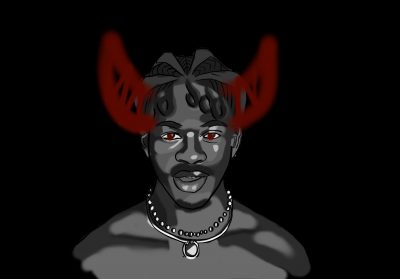Should I like the art if I hate the artist? Consider the case of Kanye West, arguably one of the best rappers in the game. I disagree with many of West’s public statements, but I would say his music is still valuable.
In the aftermath of Hurricane Katrina, he said, “George Bush doesn’t care about Black people,” which has been proven true through Bush’s policies on the reduction of the Federal Emergency Management Agency’s funding and disregard for the Black communities that were impacted by the natural disaster.
In 2018, however, West said slavery was a choice. This is not a statement that I can justify as a fan of his. Later that same year, West had an Oval Office meeting with former President Donald Trump. Regardless of his justification for the meeting, Trump still labeled him as a friend, and it was a clear show of support for Trump’s racist policies.

West’s art tells a different story though. By sharing his own experiences through his music, West has brought mental health to the front of the conversation. While there certainly were rap songs about mental health before West came onto the scene, his openness about his bipolar disorder on the album “Ye” has helped destigmatize and increase awareness surrounding the subject.
Is it ethical for me to enjoy his music if I am not a fan of him as an artist and the statements he makes? To answer that question, it is important to consider if the art West produces can be separated from his real personality.
In my understanding, West the person and West the artist are the same. All the mistakes he made as a person were made, too, by the phenomenal artist. Because art and music are such personal, intimate endeavours, the content he produces is evidently not neutral or separate from his identity.
But this does not necessarily mean his work should be hated.
Consider the popular philosopher Plato: His work shapes the modern philosophical understanding of the world despite his support of slavery. Plato’s work has cultural and intellectual value that holds true in the face of his racism — even though his biases were prominent in his philosophical beliefs.
To provide another example of a musician who receives a lot of hate for their work, consider Montero Lamar Hill, whose stage name is Lil Nas X. He recently released the song “MONTERO (Call Me By Your Name).” In the music video and song, he is very forward about his homosexuality. He pole dances to hell, gives Satan a lap dance, kills him and takes his place as the prince of hell.

With this, he proves that his personality and identity are not separate from the music that he produces. It isn’t surprising that such an explicitly gay music video set in hell has been targeted by homophobic and uber-religious people across the United States.
Yet there have been many songs referencing hell that have not gotten the same level of hate. Billie Eilish’s “all the good girls go to hell” referenced similar religious themes but received a much less intense response. I wonder if this is because the artist Eilish is a white woman or because the song itself did not reference being queer.
Lil Nas X certainly should not be receiving hate for his work simply because it exposed the complex relationship between queerness and modern religion. His example only serves as a demonstration of how the public also views art as an extension of the artist.
The most extreme example of when an artist should rightfully be vilified is when artists spread neo-Nazism in the 1980s. Punk rock groups created Rock Against Communism, a series of concerts in the United Kingdom. RAC is a sect of neo-Nazi white supremacy, and this music is explicitly based on hate — it cannot be separated from the artists’ ideologies.
In instances such as these or when the artists have crossed a line, they and their art should not be supported at all.
Ultimately, artists such as West are put on a pedestal and their mistakes are magnified by the media. In West’s case, his everyday struggles with his bipolar disorder are much more public than the other millions of people who struggle with this condition, and he helps amplify these voices by sharing his own.
Though art cannot be separated from the artist, I believe artists like West can be valued for their contribution to music — or whatever medium they work in — and at the same time be criticized for their statements and behavior. But if their art is saturated with inappropriate and bigoted beliefs or if their behavior is based on hate or violence, we should not support them in any way, shape or form.













